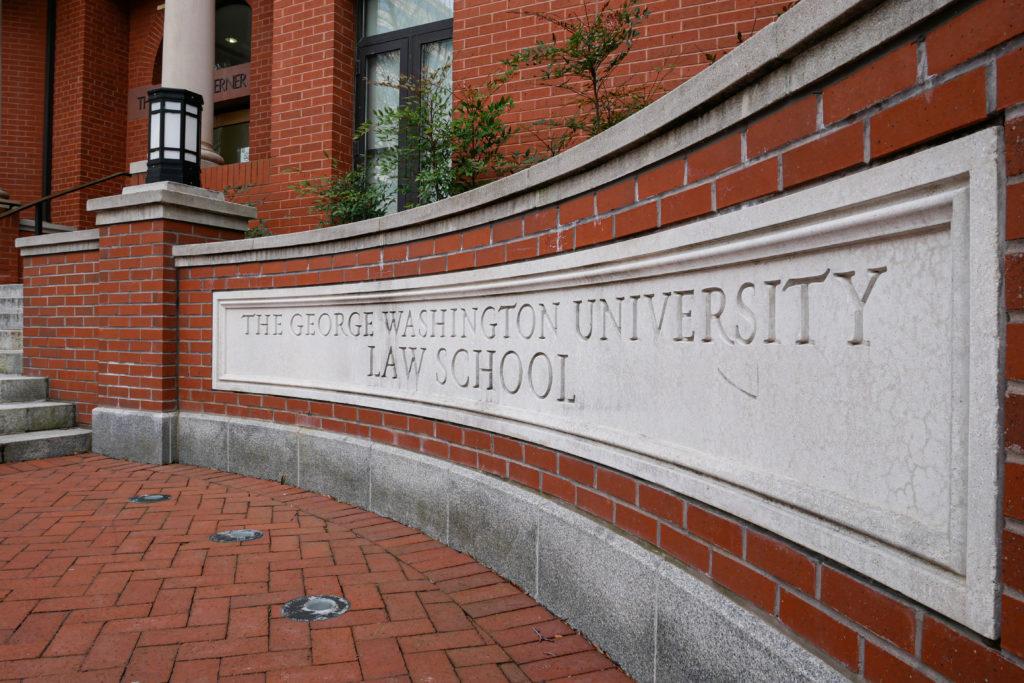GW Law will roll out three courses later this academic year as part of an ongoing expansion of a law program providing professionals with expertise in cyber and national security law through new courses and virtual degree options.
Lisa Schenck, who was named the inaugural associate dean of the National Security, Cybersecurity and Foreign Relations Law Program last fall, said officials will roll out the Professional Responsibility and Ethics class this spring, while the Global Privacy Law and Conflict Seminar and Cybersecurity: Risk Management and Incident Response courses are up for approval next semester. She said officials expanded the program through nearly 20 new courses, a master of law degree and a master of studies in law degree, which in recent years have educated professionals on the intersection of cyber and national security law.
Marking a significant increase in courses, Schenck said the program now includes nearly 60 courses on “cutting-edge issues” in national security law, like artificial intelligence, compared to 2018 when the law school’s national security and cybersecurity specialization only offered 12 courses.
“GW Law has expanded its curricular focus to ensure our courses address both critical government infrastructure cybersecurity as well as data privacy and personal data cybersecurity concerns,” Schenck said in an email.
Schenck said the program’s master of law degrees allow lawyers to gain expertise in the “highly marketable” fields of cybersecurity or foreign relations law, like information privacy and counterintelligence. She said the program’s master of studies in law degrees cater to people who did not attend law school and do not want to become lawyers but have careers that would benefit from expertise in data security.
The program’s master of studies in law degree is part of the law school’s general master of studies in law program, which launched in fall 2018.
“With their MSL and LL.M. degrees, they learn how to protect critical government infrastructure and data through well-drafted government policies and regulatory standards,” she said.
Schenck said the program’s national security and cybersecurity master of law and master of studies in law degrees are both available virtually, so students who work full-time or don’t live in D.C. can still access the program.
She said law school officials expanded the program to include courses that address how cybersecurity issues impact both government infrastructure and everyday people, like the Foreign Intelligence Surveillance Act course that educates students on the issues of balancing national security interests and the privacy rights of U.S. citizens.
“Growing vulnerabilities from physical and cyber threats and the world’s increased connectivity through the use of modern technology and cyberspace have created the need for expanded study into cybersecurity law and regulation that protects our critical cyber infrastructure,” she said.
Lindsay Rodman, a visiting associate professor of law and a fellow with the National Security, Cybersecurity and Foreign Relations Law Program, said law school officials expanded the program over the past four years in response to the rise in the number of professionals who are “clamoring” for programs that can advance their legal literacy.
“There’s just been a real growth among professionals, in particular, trying to better themselves, improve their credentials, come back to academia and benefit from the knowledge that’s being produced within the institution,” she said.
Rodman said the program’s location in D.C. provides students with connections to alumni from the law school and adjunct faculty members who are deeply involved in national security-related work.
“The adjunct faculty are the people who are doing this work day in and day out, and then they come and teach GW Law students what today’s issues are,” she said. “Not some academic notion of what today’s issues might be, but what they are actually facing on a day-to-day basis.”
She said the law school’s local connections to national security professionals enabled the success of its national security law programs after 9/11 catalyzed the expansion of the field during the past 20 years.
Rodman said legal professionals would benefit from more education on national security issues and the legal strategies used to combat them. She said many current national security issues – like foreign cyber attacks – are “novel” because they are constantly evolving.
“Lawyers historically have made the law more complicated in order to maintain our monopoly on the ability to practice law and understand it, and that doesn’t actually serve us, the public, other people, very well,” she said. “Better legal literacy across the country and practitioners in every field is better for everyone.”
Michael Bailey, the chair of the School of Cybersecurity and Privacy at The Georgia Institute of Technology, said the law school’s expansion of the program will help the law “catch up” to developments in modern technology in the past 20 years, like the growth of the internet, and the cybersecurity-related issues they created.
“If you’re going to engage in any transformative change as the kind of change that we see in technology now in our everyday society, the law profession is going to have to change alongside of it,” he said.
Bailey said legal professionals should create more regulations to govern individuals and people and companies’ access to private information as a way to adapt the law to address issues of cybersecurity.
“We live in a world where the privacy of your information, your street address, your credit card information, things that might be stolen, but also simply your location can have incredibly profound effects on your day-to-day life,” he said.
This post has been updated to clarify the following:
This post has been updated to clarify that officials provide nearly 60 courses National Security, Cybersecurity and Foreign Relations Law Program.








